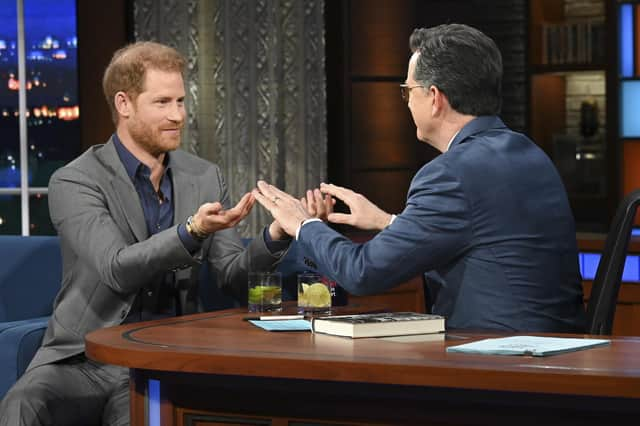Dani Garavelli: Harry has only boosted royal soap opera


However he and Meghan, and their detractors, try to frame the endless exposés - as an act of rebellion (the former) and as a grubby money-making exercise (the latter) - the whole enterprise reeks of it.
And it is self-perpetuating. The damage inflicted by grief, by dysfunctional family dynamics, by the state, by the press has fermented to the point of toxicity; to the point of no return. The couple’s lashing out may bring a temporary sense of euphoria, of pay-back for perceived injustices. But even in cold, draughty palaces, blood ties run deep, and the severing of them – while sometimes necessary - brings its own pain.
Advertisement
Hide AdAdvertisement
Hide AdMost of us know a thing or two about loss and complicated families. We may despise the privilege that keeps the Windsors insulated from our daily travails. But what is clear from listening to Harry is that privilege provides no protection from childhood trauma. Indeed privilege may have exacerbated his. The concept of monarchy is predicated on royals living epic lives on an epic stage.
But if your mourning is turned into a national circus, if you are expected to perform grief to a spectacle-hungry crowd, then the psychological fall-out will surely be epic, too. Like many people, I have thought about this ever since I watched Harry follow his mother’s coffin in 1997. As someone who lost a parent at roughly the same age, and who remembers
being told to ‘stay strong’ at the funeral, I have wondered what it must have been like to have your emotions scrutinised across the world. And to have millions of strangers co-opting your loss.
Diana’s death sparked an outpouring of national grief. Her passing may have provided a powerful catharsis for the masses, but when Tony Blair proclaimed her “The People’s Princess”, he undermined her particular significance to her sons. Add to that Harry’s justified sense that the newspapers drawing black borders around their front pages were complicit in her destruction, and the rapid introduction of Camilla into his life, and, well, no wonder he is obsessed.
Not everyone has the ability to empathise. The publication of Spare has produced an unhinged backlash from commentators who think he should “man up”, mock his lack of intelligence, and portray his book as the greatest betrayal since Brutus stuck the knife in Caesar (or at least since Ed Miliband shafted David). His inability to get over Diana’s death has been seized on as something to satirise. So-called Freudian comments have been tittered over. Many of the outraged are the types of men whose default insult is “snowflake” and who promote their alt- right views in The Spectator or GB News. But there have been others, too. Like John Crace, who summed up Spare with the line: “I want my mummy.” Crace is no stranger to talking about his feelings. He has written poignant pieces on heroin addiction and the lack of self-esteem that fuelled his. But he couldn’t summon up any compassion for Harry. Why not? Because being born into a wealthy family strips you of the right to fellow feeling?
One of the criticisms levelled at Harry is that selling his story is vulgar. We all have sad stories, the argument goes. We don’t all air them publicly. In fact, he and Meghan are in entirely tune with the zeitgeist. This is the age of the memoir, of solipsistic over-sharing, of subjective story-telling, often with little regard to the other “characters” involved. Some people post their every mood shift on social media. Writers are encouraged to spice up their work with personal revelations.
That Harry’s memoir will sell millions where others languish on a shelf is the fault only of those prepared to buy it. No book flourishes without a market; just as the monarchy only endures because enough people continue to enjoy the drama: the controversies as well as the coronations. When the public’s interest dwindles, when it stops buying into the myth, then the institution will falter.
The royal family knows this. It exists in a codependent yet mutually hostile relationship with journalists who both build it up and knock it down. The newspapers they work for thrive on conflict, which means individual members are pitted against each other. They are commodities whose value fluctuates like gold or oil. If gold is up, then oil is down. If Harry’s stock rises, then William’s will fall.
Advertisement
Hide AdAdvertisement
Hide AdThere is no escaping this pattern. By writing Spare, Harry may have believed he was beheading a Basilisk, but, in fact he has dangled nurturing titbits above its gaping maw. He has provided more work for the correspondents he loathes, and injected new life into the royal soap opera.
The pendulum of public opinion will keep on swinging between the brothers - tick tock, tick tock – as their relationship disintegrates. Wreckage everywhere. Despite his anger, the one thing Harry and its fiercest opponents agree on is that the monarchy *should* endure. In interviews, he - like them - speaks of it as a force for good, the implication being that the hurt he has experienced is down to individuals.
Yet everything he reveals suggests otherwise. The damage it wreaks is not incidental, but integral to its functioning There are other, more pressing, reasons for supporting its abolition: its links to colonialism, the iniquity of inherited power, the cost to the taxpayer. But monarchy, like patriarchy, also harms those who appear to be its biggest beneficiaries. Like it or not, Harry is the perfect symbol of the rot at the heart of a system that should have been jettisoned long ago.
Comments
Want to join the conversation? Please or to comment on this article.